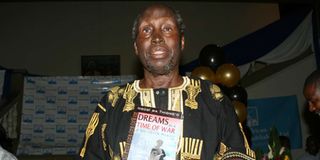Why Indangasi was wrong on what exactly makes a nation

Prof Ngugi wa Thiong'o holds a copy of his autobiography titled 'Dreams in a Time of War, after it was launched on August 19, 2010 in Nairobi.
What you need to know:
- In Indangasi’s opinion, oath-taking is a backward and criminal practice.
- The consciousness, emotional attachment and unity among members of these tribes influences how they transact business within themselves and with others.
From the onset, let me to make it clear that Prof Henry Indangasi is one of the literary critics I celebrate in this country. I have followed all literary discourse subjects he has brought up through this platform.
He has never disappointed. Every time his article is published, what follows is spirited debate. His excellent story telling skills and simple language are ensnaring.
This is why when I realised his articles had not run in the Saturday Nation for nearly a year, I became concerned. I reached out to him at his office at the Education Building of the University of Nairobi. I requested to know why I no longer saw his works. Without delving much into reasons, the soft spoken professor promised to be back soon.
I was grateful that he spared some time to point out what he felt was the greatest undoing of Ngugi wa Thiong’o. He particularly singled Ngugi support for oath-taking in his book Weep Not Child. In Indangasi’s opinion, oath-taking is a backward and criminal practice.
To support this argument, Prof turned to Shakespeare’s Julius Caesar and used Brutus to show how Ngugi’s endorsement of oath-taking was inappropriate.
In the play, Brutus dismissed Cassius’ suggestion that schemers against Julius Caesar bind themselves through taking an oath because it could prove that they were not fully persuaded about this cause.
I woke up to his lead article (Saturday Nation, October 19, 2020), titled “Why Ngugi should have rejected Catalonia prize.” It was not surprising that Indangasi found fault with Ngugi, this time for receiving a prize from a people who, in his opinion, masquerade as a nation when they are not.
Mau Mau fighters
In a previous article, Indangasi had criticised Ngugi for celebrating Mau Mau fighters who waged war against colonialists, arguing that no African community in Kenya had a birthright over any piece of land because nearly all of them migrated from other areas outside the country.
However, his latest comments to the effect that Catalonia is not a nation and that Ngugi should have turned down the prize is unfortunate. Catalonia has for a long time been a semi-autonomous region in north-east Spain with a distinct history dating back almost 1,000 years.
For the record, the wealthy region with about 8 million people should have been recognised. In fact they had their own parliament, flag and anthem before the Madrid government whittled down its legitimacy by imposing direct rule by invoking Article 155 of the constitution.
That Prof Indangasi chose to discredit the victims rather than speak to the injustices meted out on the innocent members of Catalonian community is unfortunate. Denying the fact that there are distinct nations in this country is not right. But what I found surprising is that Indangasi turned to the dictionary for the meaning of a nation.
I may excuse Prof Indangasi on the grounds that a determination of what is a nation and what is not could be beyond a literary critic. A political scientist, unlike a literary critic, would present a more solid academic understanding of the word “nation”.
Although the concept nation has been defined by many scholars, political scientist Philip Shively said a nation is a large group of people who are bound together, and recognise a similarity among themselves, because of a common culture and a common language.
It is important for Indangasi to note that a nation, unlike a state, does not always correspond with political boundaries.
The ties which make the people a nation are psychological and spiritual. In this regard therefore, that Kikuyu, Luo, Taita or the Akamba are distinct nations.
The consciousness, emotional attachment and unity among members of these tribes influences how they transact business within themselves and with others.




